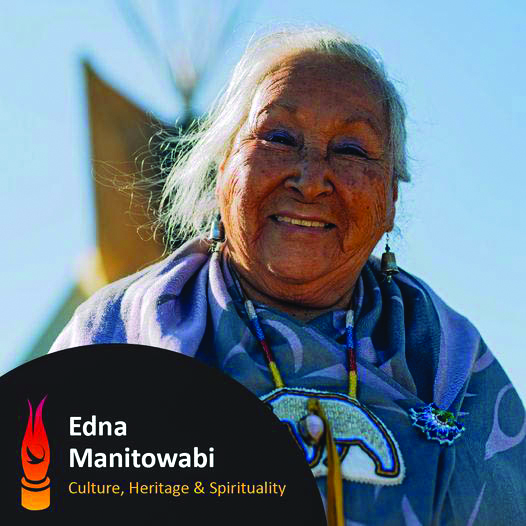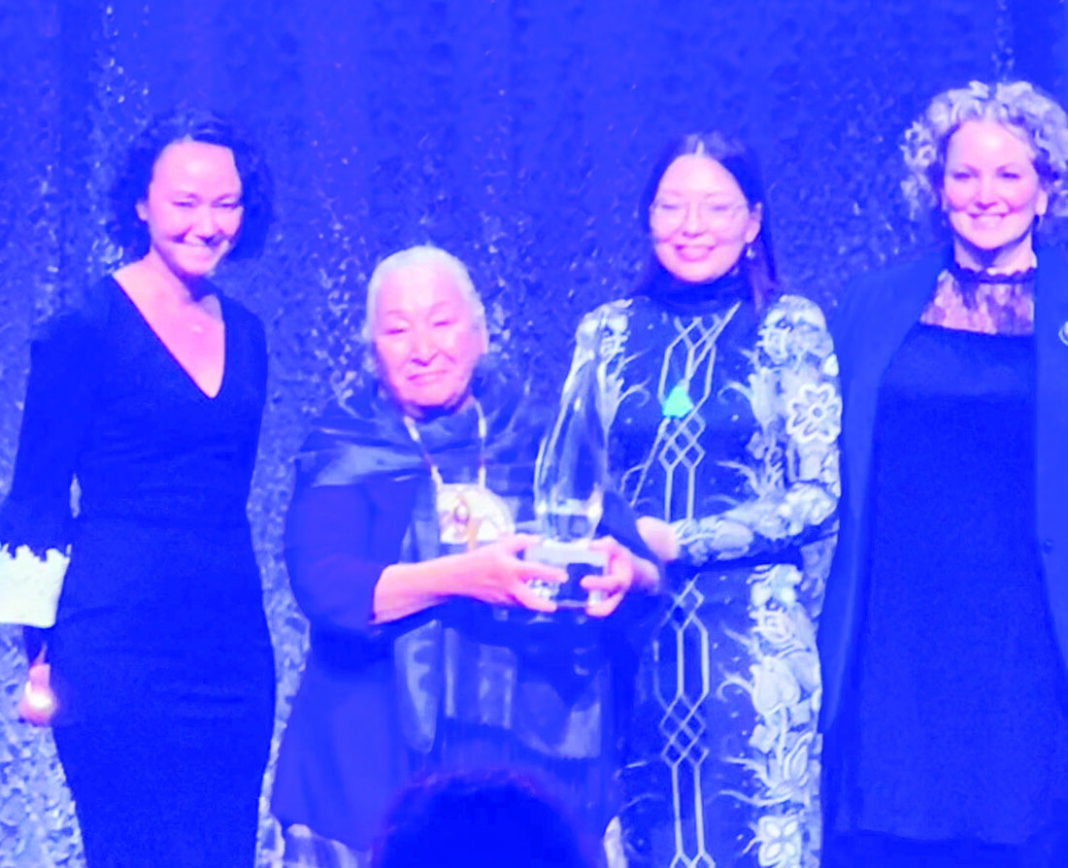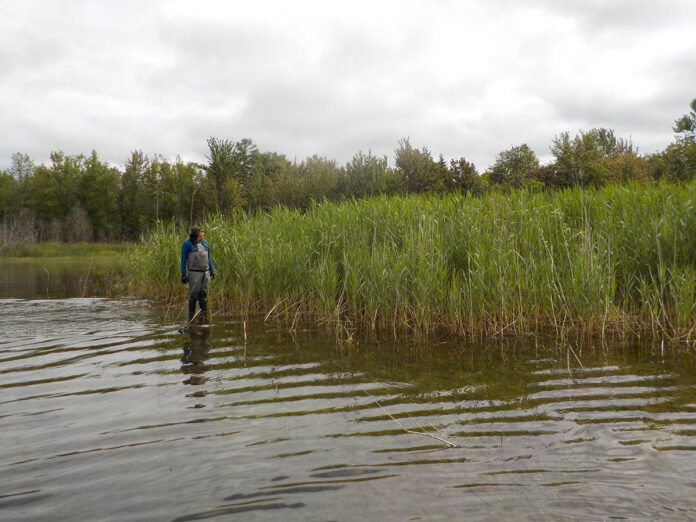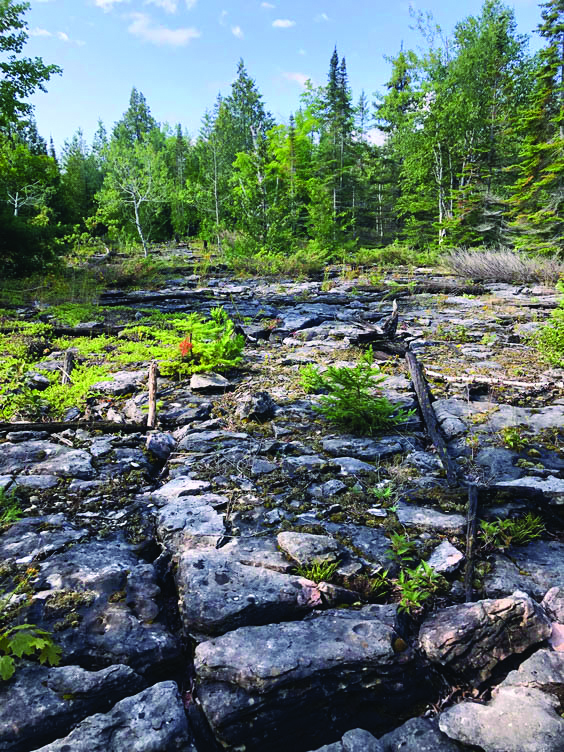WIIKWEMKOONG—Edna Manitowabi has been changing lives across Turtle Island for decades, and her work is far from finished. Ms. Manitowabi, of Wiikwemkoong Unceded Territory, received the Indspire Culture, Heritage and Spirituality Award in a ceremony held in Ottawa on April 18.
The 2024 Indspire Award for Culture, Heritage and Spirituality goes to a person who has not only recovered valuable past teachings, but who has also brought them to life and revitalized them, ensuring that generations to come will be able to walk a powerful path.
“I was so overwhelmed at being presented with this award, to be honoured by your own people, peers and family,” Ms. Manitowabi told The Expositor. “It was a huge event. There were (12 in total) recipients from across Canada. It was pretty incredible.”
“I experienced being a student in a residential school at a very, very young age. Coming from this background I sought out Elders and knowledgekeepers for knowledge and I used many of our own Anishinabek ways for healing and helping our people. It has been my life vision, something I had to do, and gave me a sense of purpose and filled my life,” continued Ms. Manitowabi. “It has been a lifelong journey. I sought out teachers and knowledgekeepers and the vision and ancestral knowledge that they provided I began to weave into my life. I remember every single one of them who affirmed, confirmed and encouraged me.”
“In those days it was taboo to provide all this knowledge, spirituality and culture, so for all those who shared these teachings it was awesome,” said Ms. Manitowabi. “And since then, I have passed on all this knowledge and culture to others. I wanted my children to hear about this—it’s their truth, their history. Being acknowledged is a great blessing. It was the Elders that said, ‘don’t give up, keep going no matter what.’”
“I am back in Wiikwemkoong now and still carrying out this work,” said Ms. Manitowabi. “My children, grandchildren, great grandchildren witness this and put in their own lives. Our youth need this knowledge, who we are as people. It is what we need to do and acknowledge what we have and who we are. It is my truth, my life, it is what has fueled me all these years.”
“I had a lot of people (at the award ceremony) there from nieces, grandchildren, peers and colleagues, from Wiikwemkoong and elsewhere,” said Ms. Manitowabi.
“I believe in our people’s traditions and ceremonies with my heart and spirit and have dedicated my life to picking up my bundles and carrying it with me in whatever space I find myself in to ensure our future generations know the strength of our ancestors and culture.”
As a teacher at the forefront of the Indigenous cultural revitalization of the 1960s and 1970s, she was a founding member, teacher and curriculum designer of the Bidassige Native Way School in 1976. With her friend Kathy Bird, she established medicine lodges in many First Nation communities across Ontario and Manitoba to share traditional medicinal knowledge.
She is a fifth-degree member of the Midewiwin Society, the head woman and the Ogimaakwe (Head Leader Woman) of the Eastern Doorway Minweyweywigaan Lodge which spans across Ontario and Manitoba. Ms. Manitowabi co-founded this Lodge with the late Chief and Ogimaa Charles Nelson of the Western Doorway of the Lodge. Edna has helped Minweyweywigaan Lodge grow exponentially.

A teacher of Anishinaabemowin, Ms. Manitowabi is also the author of teaching texts which have become key curricular components in disciplines such as Indigenous studies, women’s studies, and cultural studies. She taught at Trent University for many years and is a Professor Emerita there. She was the driving force behind the creation of Nozhem Theatre, Trent’s dedicated performance space and the Indigenous Studies Department’s biennial Native Women’s Symposium.
Ms. Manitowabi has served as the Traditional Cultural Director for The Native Theatre School, The Centre for Indigenous Theatre and the Banff Aboriginal Dance Program. She is an accomplished actress, beginning in 1994 with her first-ever role in Drew Hayden-Taylor’s play ‘Someday.’ Her more recent work includes roles in the films ‘Indian Horse’ and ‘Café Daughter’ as well as the series ‘Resident Alien.’
As a strong advocate for Indigenous peoples, a teacher of Anishinaabemowin and Anishinaabek traditions and an unfailing champion of Indigenous ways of knowing Ms. Manitowabi has dedicated her life to ensuring cultural well-being and strength for future generations.
Mary Simon, the Governor General of Canada, delivered remarks at the Indspire Awards. She said in her address, “Thank you all for being here to celebrate the exceptional contributions of Indigenous people’s across Canada. And congratulations to all the recipients we are honouring this evening at the Indspire Awards.”
“For 30 years, the Indspire Awards have been celebrating the incredible talent and innovation that exists within Indigenous communities,” said Ms. Simon. “In business, the arts, culture, language, justice, public service, education and health, Indspire is highlighting the contributions of those who have made significant impacts.”
“Tonight, we celebrate First Nations, Inuit and Metis, both young honorees and those with a lifetime of achievements, who are creating a better future for us all,” said Ms. Simon. “Tonight, we tell their stories. Stories of resilience, dedication and excellence. Stories that define them and that shape our country.”
“I am eager to learn their stories and to share them with Canadians. And it’s important that we do so. It’s important to acknowledge and celebrate Indigenous success. Through their stories, we inspire others to dream big and achieve greatness. And to embody ajuinnata.”
“As some of you know, ajuinnata is an important concept to Inuit. It means to persevere, to never give up, no matter how difficult the cause may be. I see the spirit of ajuinnata in every one of these recipients, who are working towards the betterment of our communities,” said Ms. Simon. “Their success reminds us of how far we have come on the road to reconciliation.”
Ms. Simon explained, “Reconciliation is a way of seeing and a way of living life. It is about being intentional in how we interact with one another, how we show respect. Reconciliation is a shared responsibility between Indigenous and non-Indigenous peoples.”
“I see the potential of reconciliation in so many things, in both small gestures and large public acts. Reconciliation will thrive if we nurture it, in our workplaces and our homes. It will thrive if it is taught in our schools and our public offices,” said the governor general.
“And it will thrive when we recognize Indigenous excellence, as we are doing tonight. To all of the recipients, I want to say how proud I am of all that you have done. I appreciate all you have done and continue to do for Indigenous peoples and for Canada. Once again, congratulations on all that you have achieved,” added Ms. Simon.





